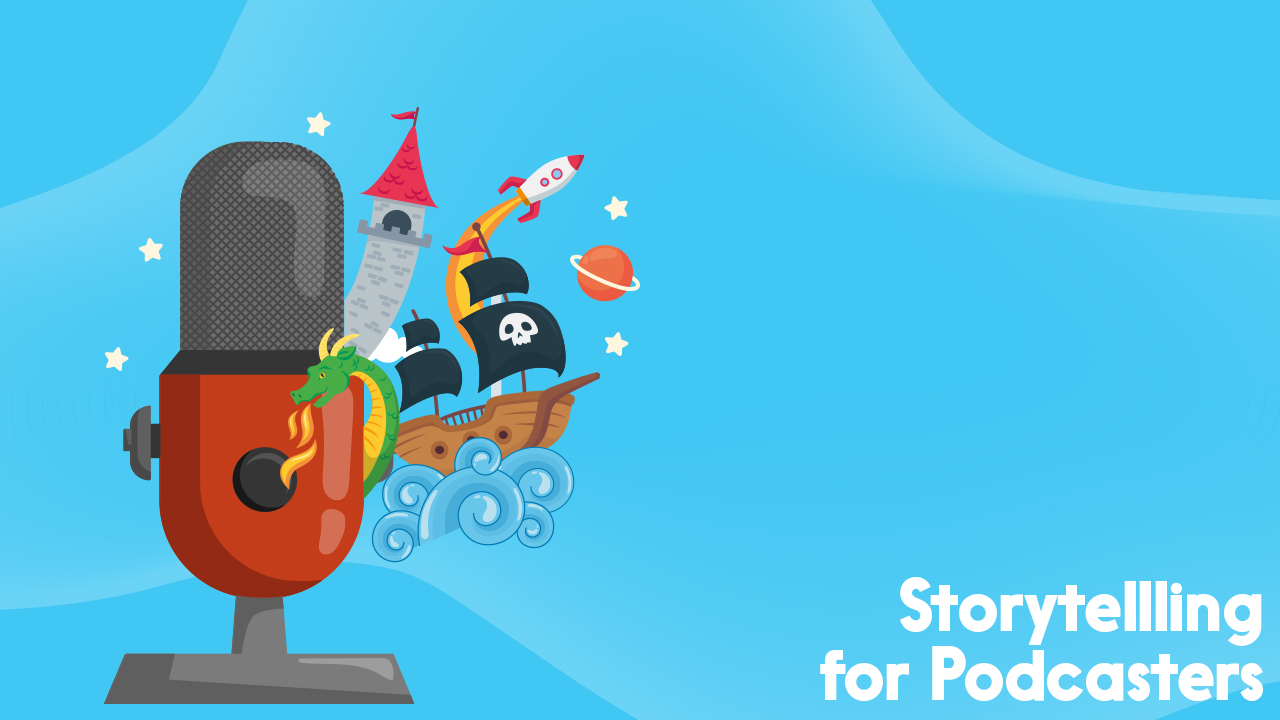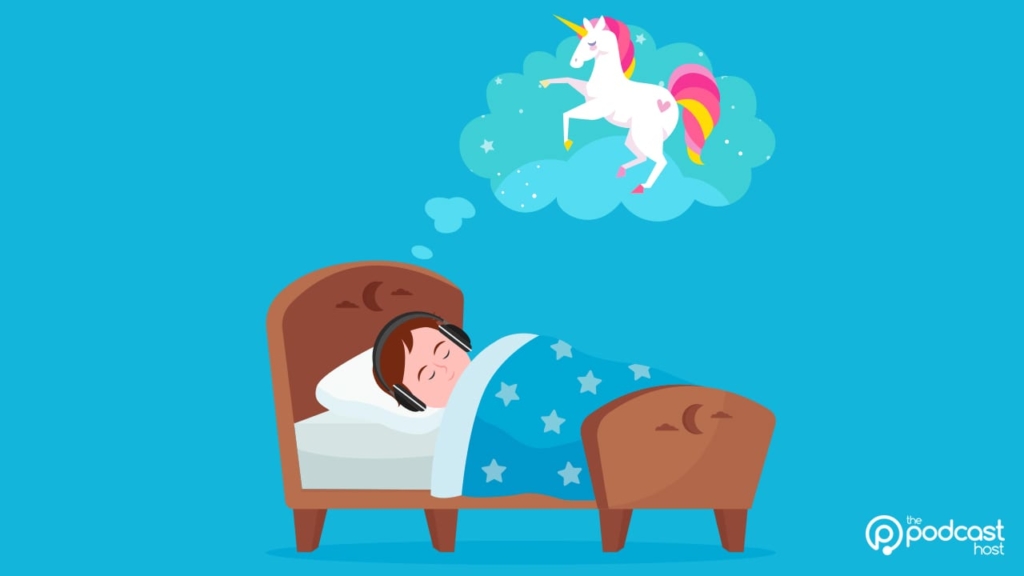Storytelling for Podcasters: The Nuance of Narrative

Storytelling tools can help you make your podcast more specific, immediate, and important to your audience. When I talk about “story,” I don’t mean fiction, necessarily. A story is change over time. Story is a recipe for how we deal with conflict. How does this work for non-fiction? Human brains like narrative and problem-solving. They like metaphor. When humans are presented with a lot of information (like in a podcast), story structure helps them process and better understand that information. Let’s take a look at some methods of storytelling for podcasters, so you can learn how to make your podcast more interesting and useful.

Why Use Storytelling For Your Podcast?
You may say, “Yeah, story, schmorey, what’s in it for me?” Maybe your interview guests tell stories, or you recap tv shows or analyze pop culture, so you reckon you’ve got this sorted. The storytelling tools I want to share with you can help you focus your material and build affinity with your audience. Stories provide education, inspiration, and connection. A story told privately (like in a podcast) builds intimacy and trust. Or, it can destroy credibility, if you don’t do it right.
Story brings a topic to life. For example, if your podcast is about rehabilitation methods for spinal cord injury, you could read scholarly papers on health research. Or, you can tell stories about what spinal cord patients did that worked or didn’t, what therapists did that worked or didn’t, when and why, and so on.
Let’s say you have a pop-culture recap and analysis show. Sharing a story about how you came to this tv show, or something it helped you to deal with, gives you more power in the podcast episode. Now it’s not just about Loki and Captain America, it’s about what you learned.
These methods of storytelling for podcasters helps your audience to put a human face on your topic and empathize with the subject matter.
What Kind of Storytelling For Podcasts Is Right For Me?
If it focuses your material, and makes it more meaningful for your audience, then it’s the right structure. Again, there are a lot of listeners who are happy to hear folks ramble all over the place, (such as in Sleep With Me). We’ll concentrate on three narrative structure methods of storytelling for podcasters: three-act, five-act, and kishōtenketsu, or four-act structure.
Three-Act Narrative Structure
In Act 1, A person wants to (do something) in order to (achieve goal). Then, in Act 2, they but comes up against an obstacle, and have to find a way over, around, or through it. Finally, in Act 3, the person ends up changed by the experience.
Example
Let’s look at the wellness podcast, Ten Percent Happier. This podcast is mostly interviews about how meditation works to help people live better lives. It’s all centered around the creator’s personal story. Dan Harris worked really hard to be a better journalist, but he had an anxiety attack on live TV (that’s Act 1). He started meditating and learned not only to cope with his anxiety, but to investigate more mindfully (that’s Act 2). He is now a better journalist, and a happier person (and there’s Act 3).
So, there’s a beginning, which establishes character and obstacle, a middle, where the character deals with that conflict, and an end, where the character’s conflict is resolved.
Five-Act Narrative Structure
Five-act narrative structure is nearly the same, but has more detail. In the acts:
- 1: A person wants something and works toward getting it. .
- 2: An obstacle gets in their way.
- 3: The person tries to go through/around/over/ the obstacle, and fails.
- 4: The person learns something from that failure.
- 5: The person deals with the obstacle again, using what they learned from failure, and succeeds. They are changed by their experience.
Example
Let’s go back to Dan Harris’ story as an example of storytelling for podcasters.
- Act 1: Dan competes to be an important and respected journalist, covering natural disasters, combat zones, mass shooter scenes, and about evangelicalism and criminal justice.
- Act 2: Dan has a panic attack on live television. He experienced difficulty breathing and speaking, which could have ended any journalist’s career.
- Act 3: Dan investigates many different scientific and spiritual methods to control his anxiety. Most are unsuccessful.
- Act 4: When Dan decides he has nothing left to try or lose, he tries meditation.
- Act 5: Dan and meditation are a good fit for each other. Through mindfulness and meditation, he is now a better journalist, and happier with himself.
What’s the Difference?
A three-act structure gets you through the highlights of a good story. A five-act structure gives you more depth because it includes what you learn from failure. This shows more change in your mean character. Try applying these structures to any story from your own life: your first day of school, the last time you quit a job, any moment where things changed.
Kishōtenketsu
I learned about this storytelling method in a Writing The Other course, Diverse Narrative Structure, taught by author Henry Lien. Kishōtenketsu is a four-act narrative structure. It originates in Chinese poetry, and developed through Korean, Chinese and Japanese traditions. You can see this in many films by Studio Ghibli, or the Academy Award-winning film, Parasite.
The first two structures we looked at depend on conflict and resolution. Kishōtenketsu depends on synthesis and harmony, to find multi-faceted ways of understanding an issue. The parts, or acts, are:
- Ki : Introduction Establishes the characters, place, and situation.
- Shō : Development More details about what we learned in the introduction. There aren’t any big changes.
- Ten : Twist The story turns, with a situation that seems to have nothing to do with the first two parts.
- Ketsu : Conclusion All the parts converge. This may not resolve things for the characters: they may still want something, or feel loss. In linear terms, the story isn’t “over.” But, The four parts combine to show a multifaceted truth to the audience.
Example
Again, let’s use Dan Harris of Ten Percent Happier as an example.
- Ki: (Introduction) Once there was a journalist who wanted to investigate and share important stories.
- Shō (Expansion of the introduction): He worked really hard to do his job, reporting from war zones and leading his network in reporting about evangelical religion.
- Ten (The twist or different angle): Later in his career, the journalist investigated different ways of achieving mental health and stability. Many of these methods sparked his scepticism.
- Ketsu (Confluence): Prior to that, the journalist spread himself so thin, that he had a panic attack live on television. It nearly ended his career. Instead, it incited his journey to find meditation. Now he’s a better journalist and has more self-respect.
Yes, there’s a jump forward and back in time in this narrative. Harris’ desire for journalistic integrity is what connects the second part to the third. What’s different is that he went from reporting about destruction to construction. At the end, his journalistic drive and integrity remained in, though his entire life changed. Storytelling for Podcasters is pretty heady stuff. Don’t overthink it too much.
What do you and your audience get out of this synthesis? Here’s your audience’s opportunity to fill in their own reflection and experience to find meaning on their own. This is a good place for questions and discussion.

Other Ways to Use Storytelling for Podcasters
Stories you create using these methods doesn’t have to be you telling a take into a microphone. In the case of Ten Percent Happier, Dan Harris uses his story for the description of the podcast, the books, and the brand. The story mirrors the audience’s anxieties and puts a human face on the problem Dan Harris wants to solve.
Mix Up Your Story Types
If you’re always talking about yourself, it gets old pretty quickly. Tell stories that have happened to others (with permission). Always let your guests tell their stories. I heard a podcast once where, every time the presenter wanted to use a metaphor, he said, “Let me tell you a little story.” It got to the point where I would tune out every time I heard those words. It was like a hypnotic suggestion. Three, two, one, and you’re asleep. So, don’t be afraid to try new things. Just make sure you use good scriptwriting practices, and get to the point.
Gathering Ideas
Always be open to ideas. There are lots of ways you can get good stories. You can use:
- Your own experiences
- Audience contributions (ask permission, respect their privacy)
- Industry or subject matter stories
- News or topical stories
- Guest stories (again, with permission)
- Dreams
Make sure you save inspiring tidbits when you come across them. David Lee Roth writes down ideas for lyrics in a pocket notebook, and calls this “banking.” Austin Kleon has a swipe file. Save up story ideas, no matter how unfinished or rough they might be, you can combine them with something else or polish them later. You can save them up in:
- A physical journal
- Phone apps like Evernote (don’t let your phone distract you, though)
- Phone recording apps: just talk into your phone. Make sure you label the files clearly for future reference. Otherwise, you’ll end up like Billy Blazejowski (from Ron Howard’s seminal cinematic masterpiece, Night Shift), who speaks any idea that comes through his mind into a tape recorder, and can’t follow through on any of them.
Writing Scripts for Storytelling for Podcasters
Scripting keeps you on track. Minimizing the script into an outline helps you sound more spontaneous. If you want to use three or five-act structure, then write down:
- Who takes action in the story
- What do they want
- What action they take to get it
- What’s the obstacle
- What they do to surmount the obstacle
- (In the case of 5-act structure:) Did they succeed or fail? If they failed, what did they learn?
- How do they end up?
If you want to use the Kishōtenketsu method, or four-act structure, then write down:
- Who
- What do they want, what’s interesting about them, more detail.
- An aspect of the story that’s completely different, though related.
- A meaningful synthesis of the whole. Ask questions of the audience.
By writing in simple bullet points, you let your voice sound more natural, as you elaborate on those bullet points.
Storytelling Is Powerful
Stories show examples of human behavior under duress, and how people change over time. They make the topic clearer and more meaningful to your audience.
There are loads of other ways to make your podcast into your audience’s best habit. At Podcraft Academy, we have courses about planning, recording, editing, promotion, audience growth, and more. Plus, with Alitu, you can automate the hard audio stuff and edit the rest with simple drag and drop tools made for podcasters. Don’t let anything get between you and sharing your story with the world.
